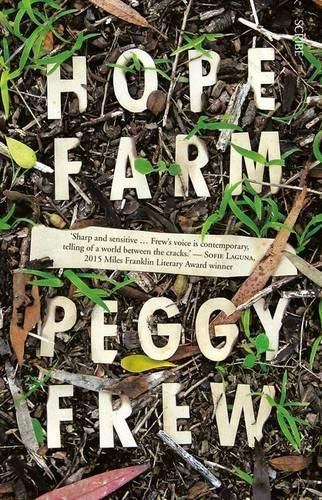Hope Farm by Peggy Frew
Those of us who encountered Peggy Frew’s Victorian Premier’s Literary Award-winning debut novel, House of Sticks, in 2010 will have been waiting with bated breath for this, her second book. Hope Farm does not disappoint.
When the novel opens it is 1985, and thirteen-year-old Silver and her mother Ishtar are living a nomadic life in Brisbane. Ishtar dreams of getting away from Australia and their ashram dwelling existence and fills Silver’s mind with notions of eating chestnuts and spaghetti in Italy. These dreams are short-lived, however. Ishtar falls for the compelling and roguish Miller, who comes into their lives and lures them down south to a hippy commune in Gippsland called Hope Farm. Silver is hesitant about the move, having been on the move since birth, but she soon begins to feel a sense of security at Hope Farm. At Hope she even gains a semblance of the family life she so desperately craves. She finds friendship with neighbour, schoolmate and fellow misfit, Ian, and they grow to cherish each other as they both navigate the awkward in-between world of adolescence.
Before long, her friendship with Ian becomes ever more important as her newfound comfort and security at Hope starts to fray and disintegrate. The adults directly in her orbit begin to clash as Miller returns from a temporary absence that coincides with the arrival of a newcomer, the enigmatic and sweet-natured Dan.
Hope Farm is peppered with Ishtar’s notes and letters, giving the story an alternative voice and adding another layer to this tale of the tense relationship between mother and daughter. It’s a study of memory, survival and the past, and explores what happens when the ties that bind are pulled asunder.
Hope Farm is a gorgeously written gem of a novel. I have not come across another Australian novel yet this year that I have enjoyed more.


